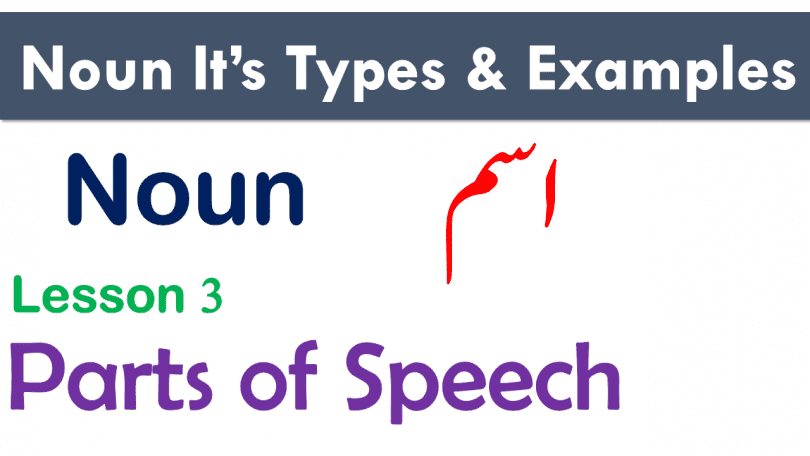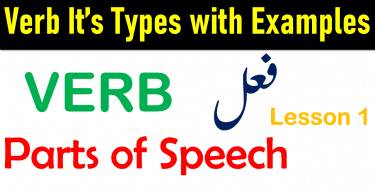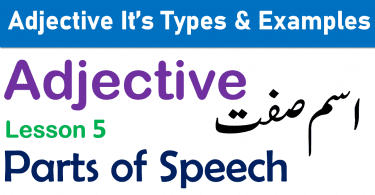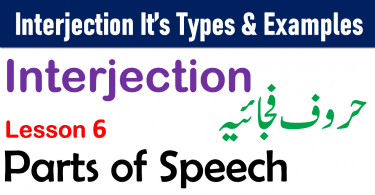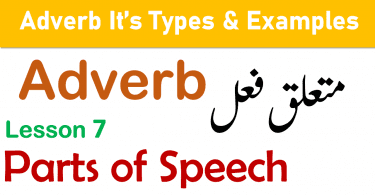Understanding nouns is essential for building a strong English foundation. In this blog post, you’ll learn the types of nouns with examples and how they are used, all explained with simple Urdu translations. This guide helps basic learners recognize and use nouns confidently in everyday English. Keep learning in our grammar section to improve step by step.
Table of Contents
What are Nouns?
A noun is a word that names a person, place, thing, or idea. In sentences, nouns often serve as the subject or object. For example, in the sentence “The teacher reads a book,” both “teacher” and “book” are nouns.
✅ Examples of Nouns
People (انسان):
- Talha – طلحہ
- Man – آدمی
- Naila – نائیلہ
Animals (جانور):
- Lion – شیر
- Cow – گائے
- Horse – گھوڑا
Things (چیزیں):
- Chair – کرسی
- Table – میز
- Book – کتاب
- Pen – قلم
- Urea – یوریا
Places (جگہیں):
- School – سکول
- Sun – سورج
- House – گھر
- City – شہر
- Lahore – لاہور
Types of Nouns in English
In English grammar, nouns are the names of people, places, things, or ideas. There are six main types of nouns. Let’s learn each with examples and Urdu meanings.
🔹 1. Common Noun (اسم نکرہ)
A common noun is a general name of any person, place, or thing.
کسی عام شخص، جگہ یا چیز کے نام کو اسم نکرہ کہتے ہیں۔
Examples | مثالیں:
- Boy – لڑکا
- Lion – شیر
- Woman – عورت
- Table – میز
- Hospital – ہسپتال
- City – شہر
🔹 2. Proper Noun (اسم معرفہ)
A proper noun is the name of a particular person, place, or thing.
کسی خاص شخص، جگہ یا چیز کے نام کو اسم معرفہ کہتے ہیں۔
Examples :
- Quaid-e-Azam – قائد اعظم
- Lahore – لاہور
- River Ravi – دریائے راوی
- Minar-e-Pakistan – منار پاکستان
- London – لندن
🔹 3. Collective Noun (اسم جمع)
A collective noun is used for a group of people or things.
وہ نام جو کسی گروہ یا جماعت کے لیے استعمال ہوتے ہیں۔
Examples :
- Committee – کمیٹی
- Army – فوج
- Class – جماعت
- Crowd – مجمع
- Team – ٹیم
🔹 4. Material Noun (اسم مادہ)
A material noun is the name of a material or substance used to make things.
وہ نام جو کسی مادے یا دھات کے لیے ہوں، جن سے چیزیں بنائی جاتی ہیں۔
Examples :
- Gold – سونا
- Wood – لکڑی
- Water – پانی
- Stone – پتھر
- Wheat – گندم
🔹 5. Abstract Noun (اسم مجرد)
An abstract noun shows an idea, action, feeling, or quality that you cannot see or touch.
ایسا نام جو کسی جذبے، عمل یا خاصیت کو ظاہر کرے۔
Examples :
- Truth – سچ
- Sleep – سونا
- Death – موت
- Honesty – ایمانداری
- Laughter – ہنسی
🔹 6. Compound Noun (مرکب اسم)
A compound noun is made up of two or more words joined together to form a single noun.
دو یا دو سے زیادہ الفاظ مل کر ایک نیا اسم بناتے ہیں۔
Examples :
- Toothbrush – ٹوتھ برش
- Bus stop – بس اسٹاپ
- Classroom – کلاس روم
- Newspaper – اخبار
- Water bottle – پانی کی بوتل
✅ Countable vs Uncountable Nouns
| Countable Nouns (گنے جانے والے اسم) | Uncountable Nouns (ناقابل شمار اسم) |
|---|---|
| These are nouns you can count. جنہیں گنا جا سکتا ہے۔ | These are nouns you cannot count. جنہیں نہیں گنا جا سکتا۔ |
| Examples / مثالیں: | Examples / مثالیں: |
| Cat / Cats – بلی / بلیاں | Rain – بارش |
| Woman / Women – عورت / عورتیں | Flour – آٹا |
| Country / Countries – ملک / ممالک | Earth – زمین |
✅ Cases of Noun (اسم کی حالتیں)
In English grammar, nouns can take different forms or “cases” depending on how they are used in a sentence.
There are three main cases:
1. Nominative Case (حالتِ فاعلی)
When a noun or pronoun is used as the subject (فاعل) of a sentence, it is in the nominative case.
جب کوئی اسم یا ضمیر جملے میں فاعل کے طور پر استعمال ہو۔
Examples:
- You broke a glass.
تم نے گلاس توڑا - I have a book.
میرے پاس کتاب ہے - Amjad went to Peshawar.
امجد پشاور گیا - Rehana eats an apple.
ریحانہ ایک سیب کھاتی ہے - He goes to college.
وہ کالج جاتا ہے
✅ You, I, Amjad, Rehana, and He are nominative case nouns (فاعل).
2. Objective Case (حالتِ مفعولی)
When a noun or pronoun is used as the object (مفعول) of a verb, it is in the objective case.
جب کوئی اسم یا ضمیر جملے میں مفعول کے طور پر استعمال ہو۔
Examples:
- We have seven balls.
ہمارے پاس سات گیندیں ہیں - Hafeez went to Sahiwal.
حفیظ ساہیوال گیا - You broke this table.
تم نے یہ میز توڑی - Razia sings a song.
رضیہ گیت گاتی ہے - Amjad writes a letter.
امجد خط لکھتا ہے
✅ Balls, Sahiwal, Table, Song, and Letter are used as objects (مفعول).
3. Possessive Case (حالتِ اضافی)
The possessive case shows ownership or possession.
جب کوئی اسم یا ضمیر کسی چیز کی ملکیت ظاہر کرے۔
Examples:
- Amjad’s book was stolen.
امجد کی کتاب چوری ہو گئی - Girls’ pens are in the bag.
لڑکیوں کے قلم بستے میں ہیں - The frame of the picture is new.
تصویر کا فریم نیا ہے - The handle of the door is broken.
دروازے کا ہینڈل ٹوٹا ہوا ہے - Ali’s house is new.
علی کا گھر نیا ہے
You May Also Like

